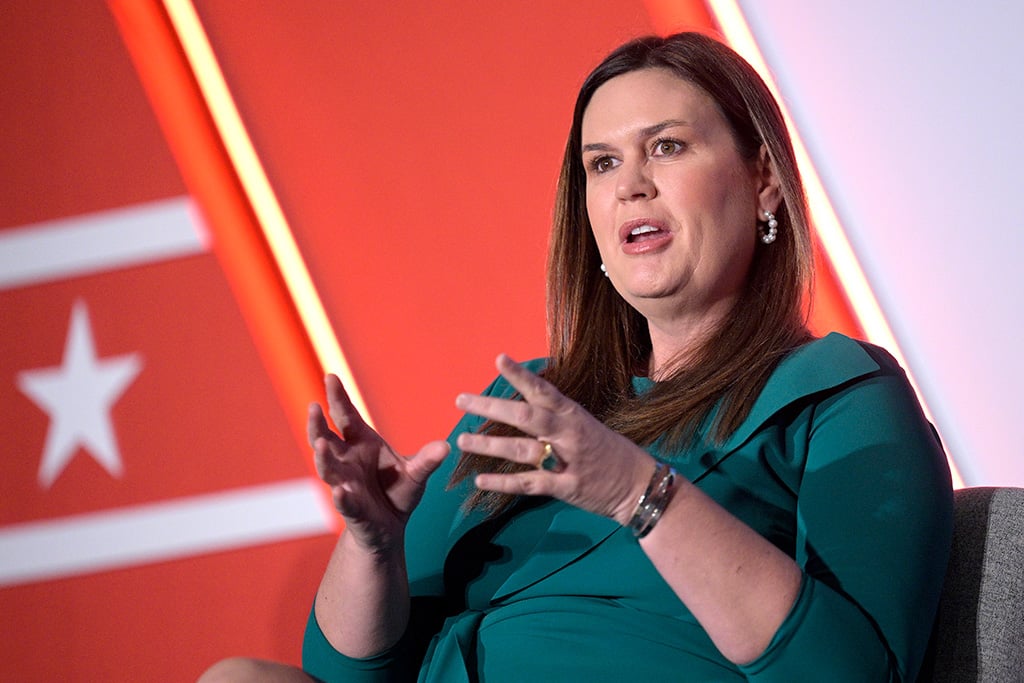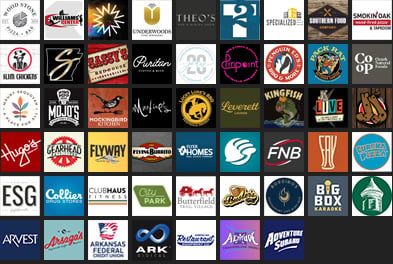 Sarah Huckabee Sanders answers a question while taking part in a panel discussion during a Republican Governors Association conference on Nov. 16, 2022, in Orlando, Fla. (AP Photo/Phelan M. Ebenhack)
Sarah Huckabee Sanders answers a question while taking part in a panel discussion during a Republican Governors Association conference on Nov. 16, 2022, in Orlando, Fla. (AP Photo/Phelan M. Ebenhack)Arkansas Gov. Sarah Huckabee Sanders issued her first vetoes since taking office in January, killing four bills this week that she said are unnecessary.
The Arkansas Legislature can override a gubernatorial veto with a simple majority, but Senate President Pro Tempore Bart Hester, R-Cave Springs, said Friday the Senate would not attempt any veto overrides.
A House spokesperson also said she was unaware of any override attempts Friday, noting that the vetoes were just announced and it may be too soon to say for sure.
The Legislature wrapped up the main business portion of the 2023 session last week. Lawmakers will return May 1 to formally adjourn sine die. Typically, that final day is reserved for any veto overrides or other unfinished business.
The General Assembly last canceled a gubernatorial veto in 2021 after former Gov. Asa Hutchinson’s veto of legislation restricting the care available to transgender minors. That law is currently enjoined from being enforced while a federal judge decides whether to strike it down permanently.
All four of the bills that Sanders vetoed passed the House and Senate with supermajorities. Sanders, though, said each bill represented unneeded spending or growth of state government.
The vetoes
The vetoed bills are:
- House Bill 1189 — It would have created a behavior analyst license for practicing “the design, implementation, and evaluation of instructional and environmental modifications to produce socially significant improvements in human behavior.” Sanders said the license would be duplicative because behavior analysts currently receive a certification. She added the proposed license would add new “red tape” and fees without ensuring “additional protections for the public.”
- House Bill 1622 — It would have created the “Heart Attack Task Force.” Sanders said this bill duplicated efforts of the Arkansas STEMI Advisory Council.
- Senate Bill 509 — It would have increased the stipend for members of the Arkansas Board of Corrections from $85 to $110. Sanders said the bill would result in an unjustifiable increase in state spending.
- House Bill 1176 — This bill is the Arkansas Division of Correction’s annual appropriation. The veto was only applied to one line item — $5 million for pandemic-related expenses. Sanders said the COVID-19 pandemic is over.
Rep. Andrew Collins, D-Little Rock, sponsored HB 1622. He said Friday he was disappointed in the veto, but didn’t plan to pursue an override. He noted the bill wouldn’t have cost any money and would’ve helped find solutions to the leading cause of death in Arkansas and the U.S. (heart disease).
The bill would have created a a 14-member task force appointed by the Arkansas Health Secretary. He said he thought the veto was “based on an incomplete understanding of what the bill did. I’m sorry that decision was made because I think it was a good bill that would’ve helped outcomes when it comes to heart attacks in our state.”
Rep. Nicole Clowney, D-Fayetteville, the sponsor of HB 1189, also said she was disappointed and frustrated by the veto.
Clowney said the bill came out of a bipartisan working group’s study of behavioral health issues in between legislative sessions and she hadn’t heard of any opposition to the bill from Sanders’ office until she was informed the veto had been issued this week.
Behavioral analysts work to address challenging behaviors in people with intellectual and developmental disabilities, Clowney said, noting their work has proven particularly effective in those with autism.
Currently, those practitioners have the option to be certified by a national board. Clowney said that creating a state license would give Arkansans greater protections, including requiring analysts to pass criminal background checks and creating a place where patients could take complaints within the state.
She noted that all of Arkansas’ surrounding states have a behavior analyst license and that the request for the new license program came from analysts in the state.
“The people who came and asked for this license, for this fee are the people who would be the ones paying it,” she said.
Sen. Scott Flippo, R-Bull Shoals, the sponsor of SB 509, couldn’t immediately be reached for comment Friday.
HB 1176 came from the Joint Budget Committee. Dina Tyler, the Department of Corrections communications director, said the $5 million was no longer needed.
“It was appropriation that covered COVID-related expenses like cleaning supplies, masks, Styrofoam, and other items we bought more of than usual because of the pandemic,” Tyler said. “It prevented us from using all our appropriation within the Divisions. It also gave us a better way of tracking those expenses. We don’t need it now.”
Arkansas Advocate is part of States Newsroom, a network of news bureaus supported by grants and a coalition of donors as a 501c(3) public charity. Arkansas Advocate maintains editorial independence. Contact Editor Sonny Albarado for questions: [email protected]. Follow Arkansas Advocate on Facebook and Twitter.

